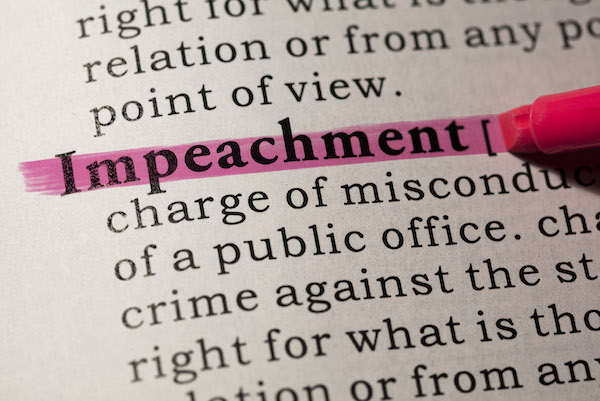Does Impeachment Mean Anything Anymore?
This article, by Doug Most, originally appeared on BU Today on September 14, 2023.

Demands to impeach politicians aren’t new. What is new is how those demands are handled
In The Boy Who Cried Wolf, a shepherd boy protecting a flock of sheep shouts, “Wolf, wolf, wolf!” when there is no wolf, until townspeople ignore his cries. When he finally does spot a wolf, he’s ignored.
Are today’s politicians on their way to becoming the shepherd boy? The more they shout “Impeach, impeach, impeach!” will the word lose its meaning and historical importance and be relegated to just another political stunt? One Boston University presidential historian says that day has already come.
“You cannot hope to have a functioning government if we are impeaching leaders every year or two,” says Thomas Whalen, a BU College of General Studies associate professor of social sciences. “Now it’s as common as a Taylor Swift concert.”
It’s not much of an exaggeration. Donald Trump was impeached twice, lost the presidency, and is now the leading 2024 Republican presidential candidate, as if his impeachments never happened. House Republicans responded by threatening to impeach President Biden, despite presenting no actual evidence of wrongdoing. Meanwhile, across the country, the Wisconsin GOP is threatening to impeach a state Supreme Court justice, the Texas attorney general has been impeached and suspended from office, the Philadelphia district attorney is fighting impeachment, and some New Mexico officials are calling for the governor’s impeachment.
Are the circumstances behind each of these legitimate and grave threats to democracy? Are they, as the US Constitution says in Article II, Section 4, examples of politicians committing “high crimes and misdemeanors?” Or is the threat of impeachment merely being used as a weapon to rile up and divide voters, with no bipartisan support and zero chance of moving forward?
“Impeachment proceedings [historically] have not been brought except in cases when there were serious crimes charged and usually a broad consensus that there was at least some crime worth investigating,” says Bruce Schulman, the William E. Huntington Professor of History at the College of Arts & Sciences, and the author or editor of several books, about the Constitution, public policy, and the White House. “They were not purely symbolic investigations.”
You cannot hope to have a functioning government if we are impeaching leaders every year or two. Now it’s as common as a Taylor Swift concert.
He says two events were instrumental in starting the shift in how impeachment is used. The first was the 1989 ousting of Jim Wright (D-Texas), the Democratic Speaker of the House [Wright resigned as speaker after an ethics investigation led by Republican Newt Gingrich, which catapulted Gingrich to national prominence]. Schulman says Gingrich exploited post-Watergate reforms of Congress and shifts in the media landscape to create a bare-knuckled brand of partisanship intent on demonizing the opposition, one that lives on today. The second moment came nearly a decade later, when the House of Representatives impeached President Bill Clinton for lying about his relationship with Monica Lewinsky. “It was almost entirely partisan,” Schulman says.
But broader political changes to the structure of how Congress works have had a more lasting impact than isolated cases. The weakening of the leadership in Congress, its inability to discipline the rank and file of the caucus, the rise of symbolic politics, and new forms of mass media have all combined to allow impeachment to take on a different purpose. Additionally, in the wake of Watergate, power to easily remove members from committees was taken away from Congressional committee chairs.
Even though there has been talk of impeachment through the decades, from Franklin Roosevelt to Ronald Reagan, Schulman says it almost never moved beyond idle chatter, and the conversation fizzled quickly. “Nobody took it seriously,” he says.
He notes that the decision of House Speaker Kevin McCarthy (R-Calif.) to embrace an impeachment inquiry into Biden is a symbolic example of what’s changed. Decades ago, Schulman says, the House speaker would have simply ignored or silenced the voices calling for impeachment. But now, he says, with the power of social media and the ability of individual members to gain visibility on their own, “the leadership is at the mercy of the caucus.
“And that makes it harder to discipline them,” he says.
There is another problem, according to both Whalen and Schulman, that’s much harder to solve: the impeachment amendment in the Constitution was written during a very different time in history.
“Impeachment turns out to be a very poor device to try to restrain abuse of power by public officials,” Schulman says. Other countries and individual businesses make it easy to remove a public official or CEO—as long as it can be shown there is no confidence in the person doing the job. He calls the impeachment process a “flawed tool” that the framers of the Constitution would be shocked to learn was still being used today.
“Impeachment was supposed to be used only under extreme circumstances,” Whalen says. “Our system is based on checks and balances, but now it’s being used for partisan revenge purposes. That is not what our founding fathers had in mind.”